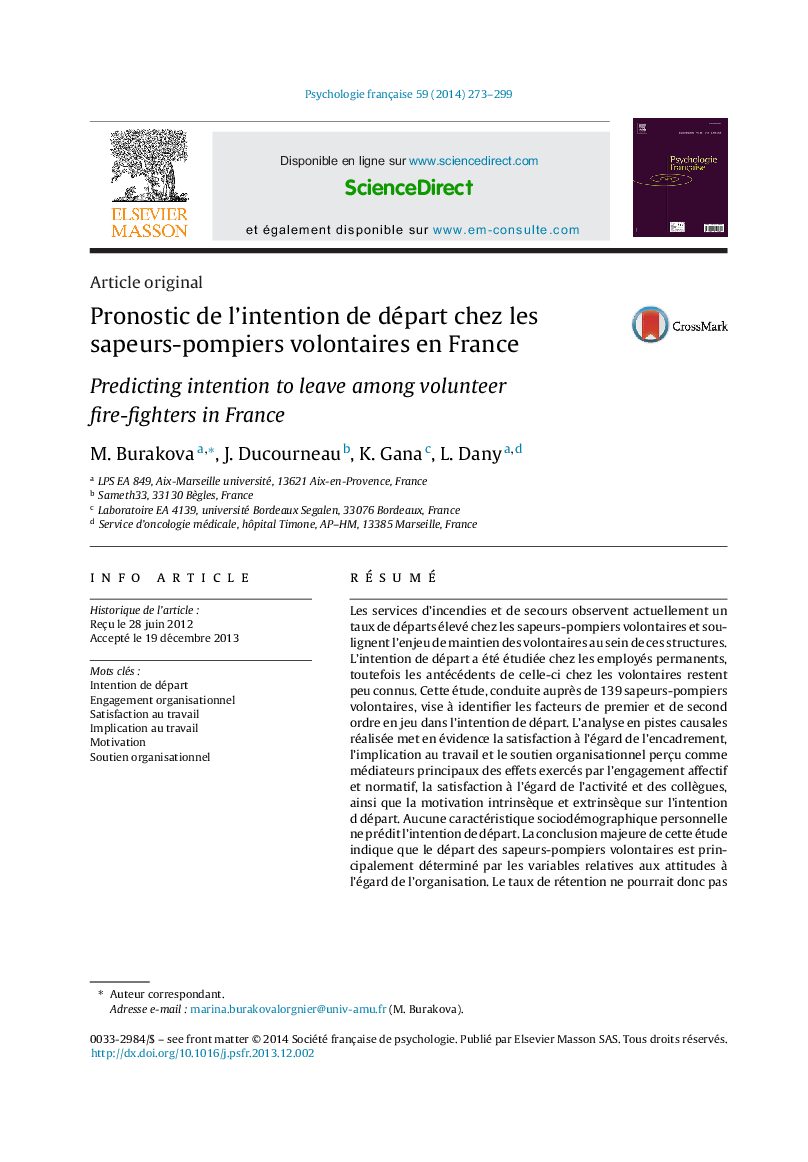| Article ID | Journal | Published Year | Pages | File Type |
|---|---|---|---|---|
| 336983 | Psychologie Franaise | 2014 | 27 Pages |
RésuméLes services d’incendies et de secours observent actuellement un taux de départs élevé chez les sapeurs-pompiers volontaires et soulignent l’enjeu de maintien des volontaires au sein de ces structures. L’intention de départ a été étudiée chez les employés permanents, toutefois les antécédents de celle-ci chez les volontaires restent peu connus. Cette étude, conduite auprès de 139 sapeurs-pompiers volontaires, vise à identifier les facteurs de premier et de second ordre en jeu dans l’intention de départ. L’analyse en pistes causales réalisée met en évidence la satisfaction à l’égard de l’encadrement, l’implication au travail et le soutien organisationnel perçu comme médiateurs principaux des effets exercés par l’engagement affectif et normatif, la satisfaction à l’égard de l’activité et des collègues, ainsi que la motivation intrinsèque et extrinsèque sur l’intention d départ. Aucune caractéristique sociodémographique personnelle ne prédit l’intention de départ. La conclusion majeure de cette étude indique que le départ des sapeurs-pompiers volontaires est principalement déterminé par les variables relatives aux attitudes à l’égard de l’organisation. Le taux de rétention ne pourrait donc pas être amélioré à travers la révision des pratiques de sélection, mais grâce à la considération plus attentive des pratiques de socialisation organisationnelle.
The fire departments in France currently experience a growing need in volunteer stuff. At the same time the turnover rate among volunteers remains high. Intention to leave was mainly examined on the population of permanent workers, while the antecedents of intention to leave among volunteers are still undervalued. We suggest the existence of specific effects different from those previously coined out in standard organisational settings. Thus, the present study seeks to identify first- and second-order factors of intention to leave among volunteer fire-fighters. The literature review leads us to the proposition of three conceptual models that vary in terms of main mediators. Either job satisfaction, or organisational commitment, or both of them are envisaged as having the main mediating effect in the model. One hundred and thirty-nine volunteer fire-fighters returned completed questionnaires. The data was further analysed via path analysis in LISREL 8.80. The results partly confirm the model, according to which job satisfaction mediates the effects of organisational commitment, job involvement, perceived organisational support and motivation. Two variables – satisfaction with supervisors and length of service – are identified as main predictors of intention to leave. Job involvement and perceived organisational support are confirmed as second-order mediators of the effects exercised onto turnover intention by affective and normative commitment, satisfaction with colleagues and work, as well as intrinsic and extrinsic motivation. The results also indicate the necessity to examine the role of different dimensions of organisational attitudinal variables independently. Thus, the most salient dimension of satisfaction refers to the relationship with supervisors. As regards organisational commitment, its calculate dimension appears to have no significant effects at all; while affective one is characterised by a weak effect on intention to leave contrary to the results previously reported. The only individual variable having a significant effect on intention to leave is the volunteer fire-fighter's length of service. We conclude that instead of seeking to identify the appropriate selection criteria helping to reduce the existing turnover rate among volunteer fire-fighters, it is time to focus further research on the practices of organisational socialisation in order to reduce the current level of turnover. The main conclusion of the study emphasises the role the attitudes towards organisation plays in the decision of a volunteer fire-fighter to resign.
